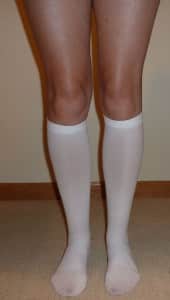To read the previous part, go to Support Socks during Pregnancy – Yes or No?
- She has a history of vascular disorders, venous insufficiency disorders
- She already has varicose veins, swollen legs or discomfort
- She already has thrombophlebitis (clot in a blood vessel)
- She is over 35
- She has a BMI of over 30, obesity
- She smokes
- She is carrying twins, which means more weight, more risk
- She will take a flight (travel ideally should take place between 18-24 weeks)
How Support and Compression Socks and Stockings Work

- By compressing blood vessels, we try to reduce vessel dilation at the same time as the accumulation of liquids in the lower limbs.
- Leg compression can compensate for a deficiency in the venous walls in the blood vessels and as such reduce retention.
The Role of Support Socks
- Soothe heavy limbs, liquid accumulation and twinges, swelling
- Reduce the risk of deep vein thrombosis (phlebitis)
- Prevent venous disorders and insufficiency
Continue reading with : Advice to Improve Venous Insufficiency in Lower Limbs During Pregnancy.


